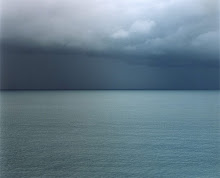After much anticipation, I finally saw Electric Company Theatre's production of Sartre's No Exit, which ran in correlation with this year's High Performance Rodeo in Calgary. I read the play last week to get a preliminary grasp of the story, but needless to say, the live production completely outdid my own internal construction of Sartre's existential classic.
The play's running time - 1 hour and 30 minutes - went by in a flash. Completely full of energy, excitement, anticipation and endless anxiety, Sartre's words were easy to grasp but hard to digest. The fast pace of the play added to the general atmosphere of anxiety and clastrophobia that is intended to mimick the sensation of being stuck in hell - but whether that hell is in life or death is up to your own personal discretion.
"Hell is other people" - No Exit's defining words, muttered hopelessly by the character Garcin towards the play's closing moments has more of an after effect than a climatic experience. Leaving the theatre, I was left with swirling thoughts that scattered themselves like an undone puzzle throughout my mind waiting to be put together.
I have yet to complete the puzzle, but there are certain pieces that have begun to take shape - at least in my own sort of interpretation. The phrase's translation is easy in some senses: rather than the traditional forms of physical torture so commonly associated with hell, Sartre gives a clever insight into the idea that in death, human beings will torture each other. However, at least point I am left wondering does Sartre see this hell only in the afterlife or is he trying to make a greater point about humanity on earth?
From distant memory, I recall two important facets of Sartre's philosophy. First, that we are ultimately free as human beings to do what we like with this like, however, that ultimate freedom comes at the price of ultimate responsibility.
Second, we are constantly struggling to exist in bad faith: in a state of being caught between two desires - the desire to exist for ourselves and the desire to exist for others. One state distracts us from the reality of other people, the other from the sense of collective responsibility we have for each other.
Relating No Exit back to the fundamentals of Sartre's philosophy, I can see a stark connection. The reality of existentialism is that we are not autonomous beings, but rather we exist in relationship with each other - we share the collective responsibility that comes with free will, and we also share a responsibility to live a life of meaning for ourselves. In life, we are often tortured by the sense of division that our responsibilities create in ourselves. Do we act alone, or with another?
In this sense then, I could see No Exit as being a cynical commentary on our relationships to each other - we are always trapped in hell - in life or death - a hell where we are constantly accountable to one another, a hell where each person has the right to inflict the mandate of responsibility on another.
However, from a slightly more optimistic perspective, I could also see Sartre's No Exit as a clever way of telling us the reality of existence - we are trapped here in life with each other - whether we like it or not - and so we must just learn how to get along with one another. Learn how not to be tortured by another's ills, learn how to co-exist as peacefully as possible.
Or - if you are the sadistically inclined type - then learn how to find pleasure in life by creating ills for your fellow man.
Whichever attitude you choose to adopt, there is a universal reality to be uncovered through the fast-paced text of No Exit - we are not alone and we depend on other people to have our own existence validated. We need each other, but at the same time we have a great capacity to hurt one another.
Wrestling an avenue of contentment between these two extremes is perhaps one of life's greatest challenges. Learning how to get along with those you disagree with, and learning how to love and be love. These are struggles that will never change as long as we live.
So really there is No Exit in life or death. It's just a matter of finding out how to live in the room that you're stuck in.
Monday, February 1, 2010
Subscribe to:
Post Comments (Atom)

No comments:
Post a Comment